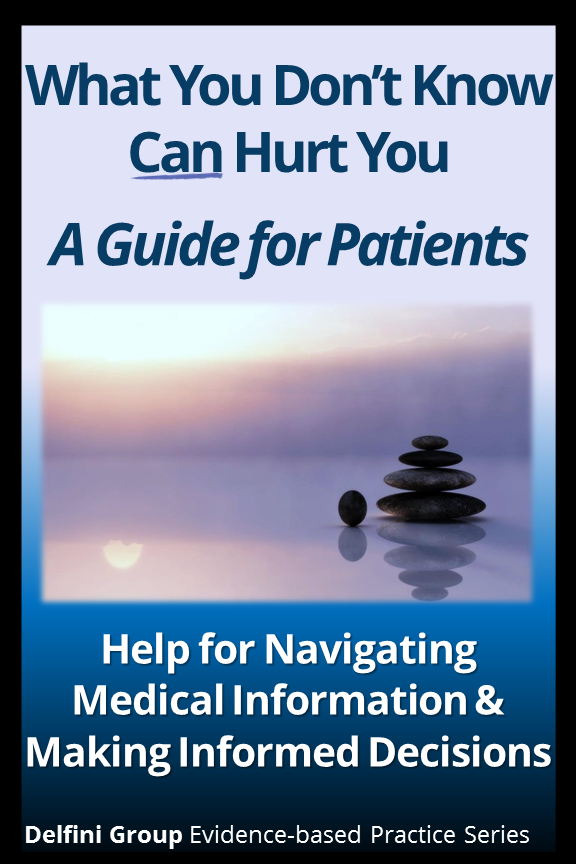Delfini Evidence-based Practice Series Guide Books
Reader Resource
Web Page
Purchase information and reviews here......or go to What You Don't Know Can Hurt You website where you can watch our video.
What You Don't Know Can Hurt You
A Guide for Patients
Help for Navigating
Medical Information &
Making Informed Decisions
Disclaimer: Use of the information we provide implies agreement to our Notices.
Reader Resource Page Menu........
- What the book is about
- How to use the book: advice from a patient reader
- Health care problems discussed in the book: high-level summary (see the book for details)
- Help for patients: downloadable book supplement + suggested web resources
- Help for patients and their health care providers
Also see our book website and video.
........
This book is about patient health care decision-making. It is about how information, communications and engagement can inform your unique and individual personal health requirements which will affect the health care decisions you make.
This book addresses—
- What optimal health care decision-making looks like and what can get in its way;
- What we call the "health care information mess"—a combination of problems, the end result of which is that a lot of health care information is assumed to be trustable when it is not or is of uncertain reliability;
- What patient-centered care looks like and typical challenges for getting patient-centered care—including some insights into some of the hidden worlds of doctors and health care systems; and,
- Advice to help you navigate health care decision-making challenges, including suggestions for how you can prepare to make a medical decision and effectively participate to improve your chances of getting the care that is right for you.
........
How to use the book: advice from a patient reader—
"This reads like a handbook/guidebook, and I think it just begs to be treated as something people can draw from throughout their lives. This book is very user friendly, and I suggest you encourage people to, not only read it, but live with it and really use it, write in it, highlight it and take it along to medical appointments in order to make sure they get the most from their provider visits."
........
Health care problems discussed in the book
Key points you need to know—
- Patients greatly overestimate benefits + underestimate harms of medical interventions.
- Reliable medical science is required to inform many kinds of health care decisions.
- Opinions may be right and they may be very wrong: even doctors' opinions.
- Much published medical science—even in the most respected medical journals and by some of the most respected researchers or research institutions—is not trustable.
- Health care providers frequently do not know—
- Health care information sources—and this includes people—are frequently inadequate to truly help you for the following reasons—
- Health care is a business, but not like any other business.
- Many problems in the health care business are "system" problems.
- Your doctor has little time.
- Patient care is not always "patient-centered care."
- How your doctor communicates with you and relates to you can help or hurt you + health care provider communications with patients are not always optimal.
- You cannot give "informed consent" to medical interventions without reliable and useful information.
How big the problem of unreliable medical science is.
How to detect unreliable medical science.
How to interpret study results.
The reliability of the science is ignored.
Choices are often not communicated.
What you can expect is often not communicated.
What you are told you can expect is often misleading.You are often not told if the research fits you.
More reading
- Why evaluating published medical science is vitally important for patient care
........
- Downloadable book supplement (see below for downloadable summaries of Appendices A + B)
- Suggested web resources
- Help for patients and their health care providers
Your "patient requirements" are an important dimension of health care decision-making and include your own personal health care problems, your own special circumstances, and your values and preferences, all of which go into informing your health care needs and wants.
Book Supplement
This is downloadable as a Word document so that you can edit it to use it in the way that is most helpful to you. (Also available as a PDF.) It includes—
Summary of Appendix A: The Patient Guide Summary
A1) Medical Information Principles for Caring for Yourself as a Patient. Review of important core patient-centered concepts from the book.
A2) A Summary of What I Need to Know for My Medical Information Journeys. Tips to help you prepare for gathering needed information and some important considerations for making a decision. It includes The 7 General Questions Patients Want Answered along with the General Questions to Help Patients Evaluate Answers.
A3) Practical Tips for Preparing for and Participating in Your Medical Encounter. Preparation advice for medical encounters and help for during the encounter.
Summary of Appendix B: Supplement to The Patient Guide—More Details and Suggestions About General Questions For Which Patients Need Answers
........
Suggested web resources for patients
There is no one source on the web that can provide you with one-stop shopping for health care information, but here are several you can try for different purposes.
We consider these sites to generally be of high quality or helpful as described. You should be aware that information contained in any health care information source may be of varying quality. See our Health Care Information Source Cautions at our Notices.
MedlinePlus may be a good starting place. In alphabetical order:
| Suggested Website & How It Might Help You |
|---|
Agency for Healthcare Research and Quality (AHRQ) Question Builder |
The Cochrane Collaboration Patient Resources Informed Health Online |
HealthNewsReview.org For those with access to JAMA, you may be interested in his article: Schwitzer G. A guide to reading health care news stories. JAMA Intern Med. 2014 Jul;174(7):1183-6. doi: 10.1001/jamainternmed.2014.1359. PubMed PMID: 24796314. |
Healthwise |
Mayo Clinic Patient Care and Health Information |
MedlinePlus |
PubMed Where included in the NLM, our citations include the PMID number, which is the PubMed identification number. You can input this number into the PubMed search box to access the abstract and sometimes free full text. |
| Also, here are some information resources we recommend for your doctor and other health care providers. |
........
Help for patients and their health care providers
Patient/Provider Help Menu........
- Why critical appraisal of medical science matters for patient care
- Critical appraisal tools: a sampler
- Recommended resources for (potentially) reliable scientific information and other help for patients
- Physician/patient communication tool
- Decision support examples
- Many more resources are freely available at the main Delfini website at www.delfini.org +
- See our books including Basics for Evaluating Medical Research Studies: A Simplified Approach: And Why Your Patients Need You To Know This
Why critical appraisal of medical science matters for patient care
Critical appraisal tools: a sampler
- 1-pager learners version for superiority studies
- 1-page critical appraisal checklist for interventions—pro-version
- Systematic review critical appraisal checklist for secondary studies
- Secondary sources (e.g., clinical guidelines) checklist
- More tools for clinical quality improvement are available here including Word versions
Recommended resources for (potentially) reliable scientific information and other help for patients
We consider these sources to generally be of high quality or helpful as described. You should be aware that information contained in any health care information source may be of varying quality. See our Health Care Information Source Cautions at our Notices. Also, see our suggestions for patients.
Physician/patient communication tool
Delfini Clinical Tool: Patient Information & Engagement: Communication guide for physicians and others who directly engage with patients to provide information, decision and action-oriented information during clinical encounters.
See our suggestions for patients as well as our Messaging Scripts and other physician/patient resources.
........
Delfini Group
Authors Sheri Ann Strite &
Michael E. Stuart MD

Many other resources to help you with evidence-based clinical improvement are freely available from us at www.delfini.org.
............
Go To Delfini




